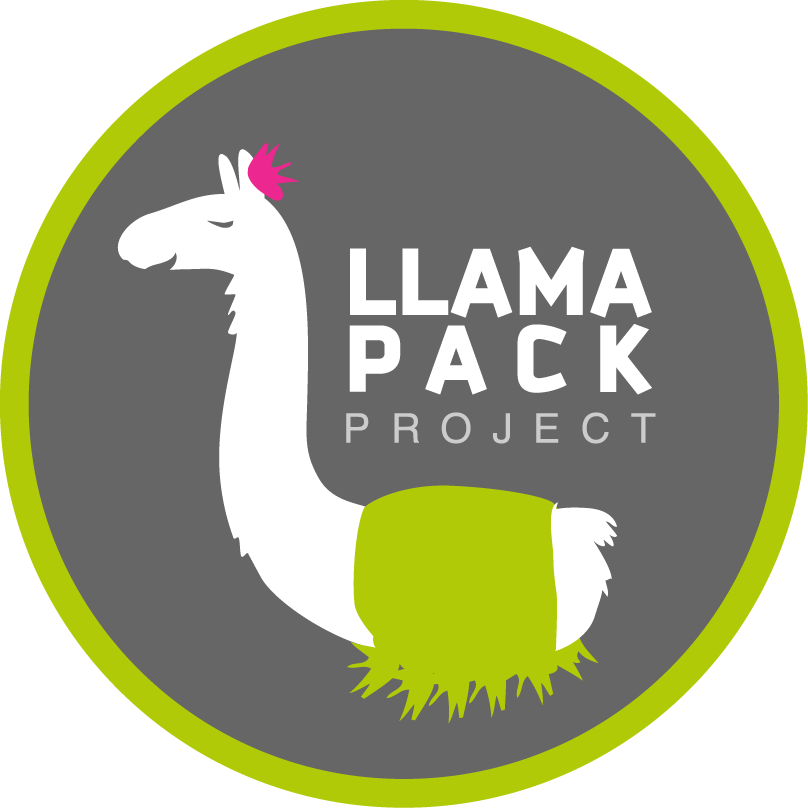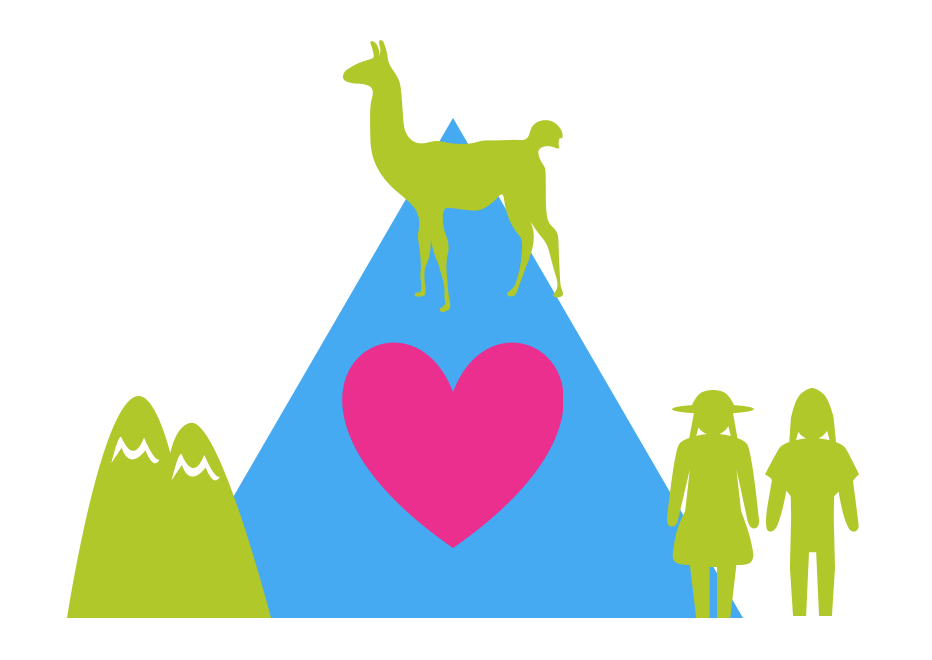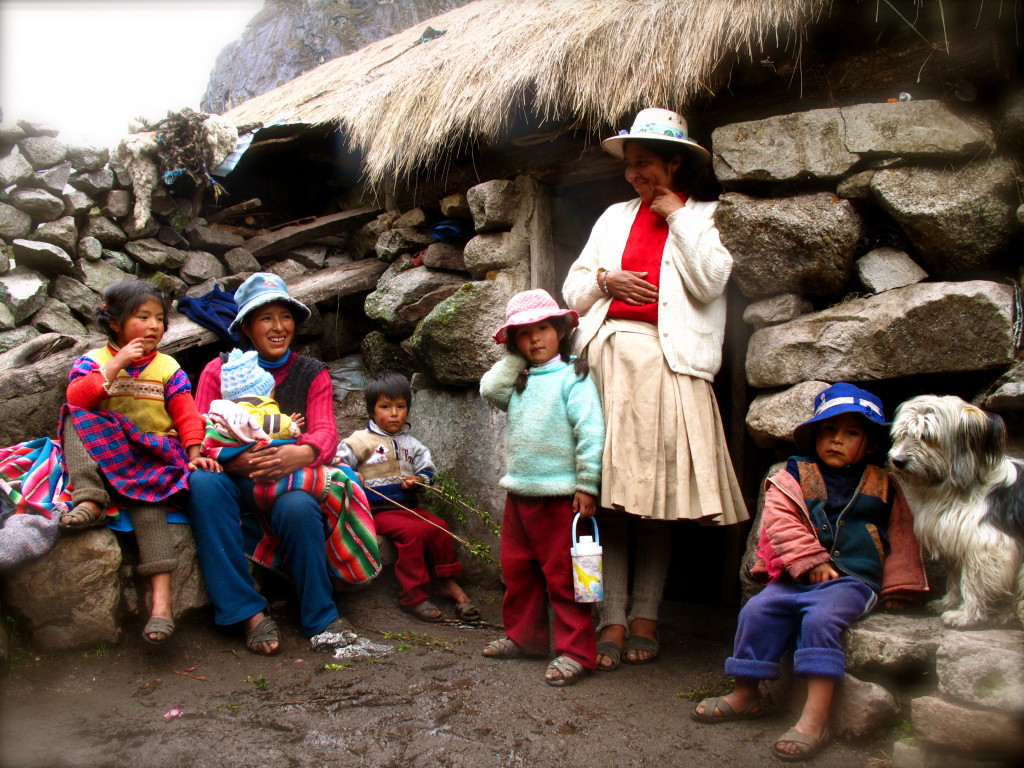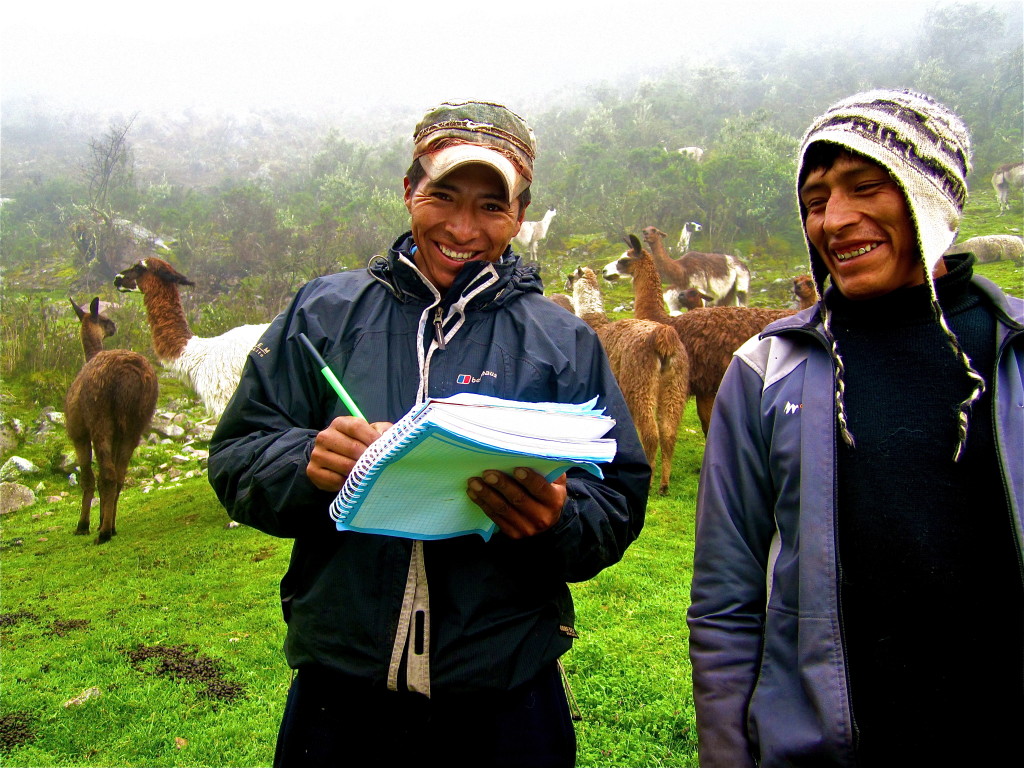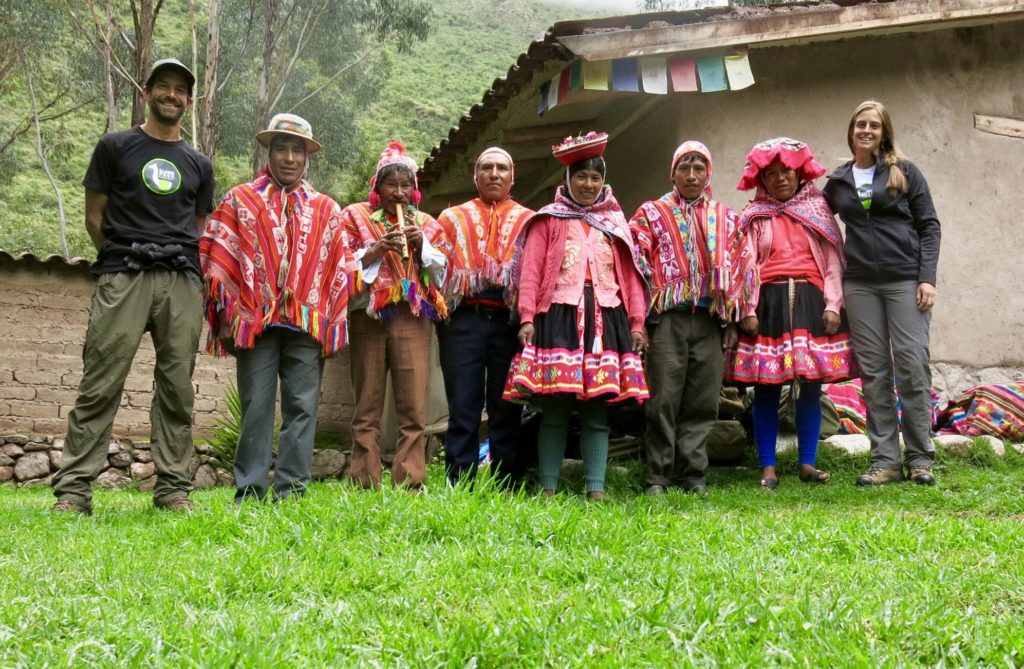Project

Our Mission
The Llama Pack Project works to recover traditional uses and breeding of pack llamas for the tourism industry as a tool for sustainable rural development and conservation of mountain ecosystems in the Urubamba Mountain Range of Cusco, Peru.
Capacity-Building Programs
To achieve our long term social and environmental goals, capacity-building activities and workshops are provided for members of the Guild of Llama Breeders and their families on a rotation basis through our three main programs: Healthy Llama Breeding, Education for Conservation and Sustainable Tourism.
Skills gained in the programs help llama farmers and their families provide and community based organized and eco-friendly pack service with their llamas to tour operators allowing them to receive an alternative income to improve their quality of life while responsibly managing their natural resources.
Healthy Llama Breeding Program
The Healthy Llama Breeding Program has been created to help improve the quality of llamas owned by families living in vulnerable situations in the Urubamba Mountain Range so that their animals meet the necessary characteristics to be competitive pack animals for the tourism industry.
The llama is an animal native to the Andes mountain range, fully adapted to mountain ecosystems, making it an eco-friendly animal that has been used since ancestral times for pack labor.
The llama is also an animal that is resilient to the effects of climate change and can contribute to the family economy in various ways (fiber, fertilizer, fuel, protein).
Due to the loss of healthy breeding practices over time, llamas have deteriorated by mix breeding with alpacas, among other reasons, producing hybrid animals that do not have the ideal characteristics for packing (size, strength, health).
Currently the tourist operation in the Urubamba Mountain Range transports tourist loads during trekking excursions (backpacks, tents, food, etc.) with exotic animals such as the mule which, being an introduced animal, is not adapted to these fragile ecosystems, generating a negative impact (erosion and compacting of ancestral roads, contamination and reduction of natural pastures, among others).
To minimize the impact generated by tourism in the Urubamba Mountain Range and generate opportunities for labor inclusion for local families the Llama Pack Project promotes the ancestral use of llamas as pack animals.
By having good pack llamas the community members will be able to provide pack services and work in the tourism industry providing an environmentally sustainable tourism service.
The following activities help achieve the Healthy Llama Breeding Program goals:
– Animal registry and evaluation.
– Veterinary campaigns.
– Courses and trainings on healthy llama breeding.
– Community Llama Contests.
– Improved stud rotation.
Education for Conservation
The Education for Conservation Program has been created to help strengthen environmental values among children in the high-Andean communities and members of the Guild of Llama Breeders by providing tools and knowledge exchange to protect the fragile mountain ecosystems of the Urubamba Mountain Range.
The Urubamba Mountain Range, being part of the Tropical Andes, is considered a conservation hot spot by the conservation organization ‘Conservation International’. It hosts a great diversity of flora and fauna representative of mountain ecosystems that are highly vulnerable to climate change effects.
Currently the tourist operation in the Urubamba Mountain Range transports tourist loads during trekking excursions (backpacks, tents, food, etc.) with exotic animals such as the mule which, being an introduced animal, is not adapted to these fragile ecosystems, generating a negative impact (erosion and compacting of ancestral roads, contamination and reduction of natural pastures, among others).
To minimize the impact generated by tourism in the Urubamba Mountain Range and generate opportunities for labor inclusion for local families the Llama Pack Project, in addition to promoting the ancestral use of llamas as pack animals which are native and eco-friendly, promotes the valuing of natural spaces to encourage the protection of fragile mountain ecosystems and the management of tourism in a responsible and environmentally sustainable manner.
By having the necessary knowledge and tools to manage their natural areas, community members of the Guild of Llama Breeders will be able to demand and manage an environmentally sustainable and responsible tourist operation.
The following activities help achieve the
Education for Conservation Program goals:
– Community school workshops.
– Native tree nursery construction and maintenance.
– Reforestation with native species.
– Outdoor education.
Sustainable Tourism Program
The Sustainable Tourism Program has been created to strengthen capacities and provide practical tools that allow the Guild of Llama Breeders to have access to new opportunities for fair labor inclusion in the tourism sector of the Urubamba Mountain Range and to promote their active participation in the organization of tourism in their communities to protect the fragile mountain ecosystems.
The Urubamba Mountain Range, due to its scenic beauty, is one of the most visited trekking destinations in Cusco, generating an opportunity for sustainable development for the high-Andean communities through tourism.
Currently, the tourism operation benefits a small number of community members due to the difficulty of the local population to access training opportunities and the logistical difficulties presented by access and communications challenges, which is why despite the tourism growth in the area, families are still unable to improve their quality of life.
To help improve the quality of life in the high-Andean communities of the Urubamba Mountain Range and reduce the impact generated by pack animals from the tourism industry, the Llama Pack Project seeks to promote the active participation of community members in tourism management so that they can receive more benefits providing pack services with their llamas, a native and eco-friendly animal, among other tourism services in an organized and rotating manner.
By having the necessary tools, the Guild of Llama Breeders can request travel agencies and tour operators to work under its guidelines for fair work and hire environmentally responsible services to protect the Urubamba Mountain Range, which is considered by the conservation organization ‘Conservation International’ to be a hot spot for conservation.
The following activities help achieve the Sustainable Tourism Program goals:
– Llama Trek Model Training.
– Llama Caravan of integration between communities to strengthen the Guild of Llama Breeders.
– Training in impact minimization for sustainable, responsible and regenerative tourism.
– Strengthening of capacities in tourism services.
– Training in First-Aid and evacuation of wounded in wilderness areas.
The Beginning
The Llama Pack Project was born in 2012 after we found an opportunity to contribute to the development of our neighbor high-Andean communities in the Urubamba Mountain Range (the mountain range that provides water to most of the fields and towns of the Sacred Valley of the Incas).
Challenge: While enjoying outdoor activities in our breath-taking surroundings we met amazing families who welcomed us into their homes and shared life stories with us. These families all have rich cultural backgrounds that are on the verge of disappearing, forced by urban dwelling due to the lack of access to work and training opportunities.
Resource: Most families own llamas, raised in semi-wild conditions, which are used only twice a year to transport potato seeds and harvest. Although llamas in the area are quite small due to inter breeding, the potential of llama improvement is vast.
Opportunity: The area is currently being promoted for alternative tourism treks commonly sold as the ‘Lares Trek’ by an increasing number of tour operators and travel agencies that require pack animals to transport camping material.
Ecosystem: As climate change effects increase affecting our glaciers and tourism impact grows, we find an urgent need to mitigate these impacts and contribute to empower local community members by providing access to training and work opportunities that will allow families to become active guardians of our mountains and water resources.
Project Formula
Current situation on llamas
Pure breed llamas have almost disappeared in the Urubamba Mountain Range, instead families own small llamas mixed with alpacas that have poor fiber quality and are not able to carry a significant load.
During the Inca Empire llamas were considered sacred and were fundamental to their economy, owning them was a symbol of privilege. Historically, llamas were abolished as a means of subverting local indigenous people during the colonial power struggle and therefore traditional knowledge related to llama breeding practices disappeared.
Currently, llama breeding is practiced mainly by the most excluded families of high-Andean communities who do not provide an economic use for their llamas due to their lack of knowledge on systemized breeding.
Project Goals
Sustainable Rural Development
Ecosystem Conservation
Llama Breeding
We envision empowered communities that are able to hope for a better future and make it a reality. We pursue this goal by combining access to alternative sources of income with access to multi disciplinary education and training in order to provide community members with necessary skills and tools to pursue their own goals and find an attractive alternative to urban dwelling.
Sustainable Education:
- Training on healthy llama breeding practices.
- Training on tourism services.
- Soft skill building workshops.
- Complementary environmental education.
- Healthy living and illness prevention education.
Alternative sources of income:
- Innovative mobilization of their camelid resources.
- Creation of the llama trek service.
- Inclusion in the local tourism industry.
- Community networking and collaboration.
We envision empowered communities that protect their water resources, native forests, pastures and ancestral trails while disseminating environmental awareness amongst visitors. We pursue this goal by facilitating environmental conservation through actions and education.
Environmental Conservation Action
- Use of native pack animals: llamas.
- Native tree reforestation.
- Sustainable agriculture and pasture management.
Environmental Conservation Education
- Environmental education for children.
- Participatory venues.
We envision an empowered community network capable of utilizing their camelid resources to provide en environmentally sustainable pack service to all agencies and tour operators that work in this mountain range. We pursue this goal by encouraging healthy breeding practices and inclusive job creation.
Healthy Breeding Practices
- Model project of best practices.
- Recovery of pure breed llama.
- Technical training venues.
Job Creation
- Llama Trek service.
- Textile sales.
- Culinary workshops.
- Project programs.
Area of Impact
We work with high-Andean communities that are located between 3,200 – 4,500 meters above sea level within the Urubamba Mountain Range which is parallel to the Sacred Valley of the Incas.
These communities are traditionally agricultural and pastoralist communities. Average education level is primary school. Spoken native language is Quechua, usually only men have average Spanish proficiency. Access to schools and public health is limited. Acess to the communities is either by foot or dirt roads. Population sizes range from 120 – 900 people corresponding to 30 – 95 families.
We started working with two families from two different communities. We now work with twenty different families from those communities and have incorporated project bonds with other seven communities upon request from community leaders. For every llama breeding family that participates in the project, at least two other families benefit by either selling their textiles, providing meals or assisting in the trek.
If one family works during nine days per month, every month, providing llama trek services, they would have enough income and skills to get out of their poverty condition and have enough weeks left to participate in all their community tasks.
Project Sustainability
Our efforts and actions are possible thanks to the solid combination of our nonprofit aimed at providing multidisciplinary sustainable education, and our social venture aimed at facilitating access of rural communities to tourism industry through inclusion, fair working conditions, long term networking and continuous skill building and sustainable tourism practices.
To make this opportunity a reality we have worked with community members in different areas to create:
- Llama Trek Service – Aimed to generate an alternative source of income and pride while providing a social and environmental minded tourism service.
- Project Programs – Aimed to further community and project goals while providing a rich intercultural education setting.
- Llama Park – Aimed to provide a model project of best practices, increase breeding capacity amongst community members and provide an interactive learning experience for visitors that wish to learn about high-Andean ways of life.
Llama Pack Team
We always work with the approval of the community leaders after presenting the Llama Pack Project in community assembly.
Llama Breeding Families
We work with the Llama Breeding families that want to be part of the project and cooperate with other families that wish to collaborate in the project.
Community Schools
We have partnered with community schools to promote environmental awareness and general education needs, to make this project a long-term sustainable initiative.
Interpreters
All the interpreters that are part of the team work not only as guides for the llama treks but actively participate in the community skill building workshops and other project activities.
Project Leaders
We are both Peruvian social communicators with backgrounds in cultural and identity project management and masters in conservation area management.
Accomplishments
2017
2016
2015
2014
2013
2012
- The Llama Pack Project wins the Bio Start Up Generation II grant which promotes social and environmental ventures that generate value through the protection of high-Andean native forests.
- First 4 day workshop on healthy llama breeding practices is implemented thanks to the Tourism Cares grant with the participation of 67 families from 10 different communities.
- Eight Local Guilds of Llama Breeders are formed aiming to improve their llamas in order to provide environmentally responsible and inclusive pack services for the tourism industry.
- 2017 Certificate of Excellence provided by Trip Advisor for excellent reviews on Llama Pack Project visits.
- Llama Pack Project is invited to present in TedxTukuy in Lima, Peru.
- 2016 Certificate of Excellence provided by Trip Advisor for excellent reviews on Llama Pack Project visits.
- Llama Pack Project partners with 8 community schools to assist in environmental education and health campaigns.
- The Llama Pack Project wins the Tourism Cares grant which supports initiatives that promote responsible tourism development.
- The Llama Pack Project wins the Kunan grant aimed at catalyzing innovative approaches to social entrepreneurship.
- The Llama Pack Project makes to the 5 finalists out of 170 project for the Kunan grant aimed at catalyzing innovative approaches to social entrepreneurship.
- The Llama Pack Project is chosen by the Peruvian Ministry of Tourism and the Instituto Europeo de Diseño, as one of the two representatives of the tourism industry in Peru as an innovative social approach to tourism services, on an international design contest.
- 7 community leaders reach out to us to be part of the project.
- We develop an effective communication system given that there is no phone signal in the communities involved.
- Llama Trek service designed with community members is launched on Trip Advisor.
- 15 families join the Llama Pack Project.
- Rotating work network is implemented.
- Llama Pack Project is born.
- Two families from two communities participate in the idea.
- Llama trek service idea is developed in partnership with the community members.
